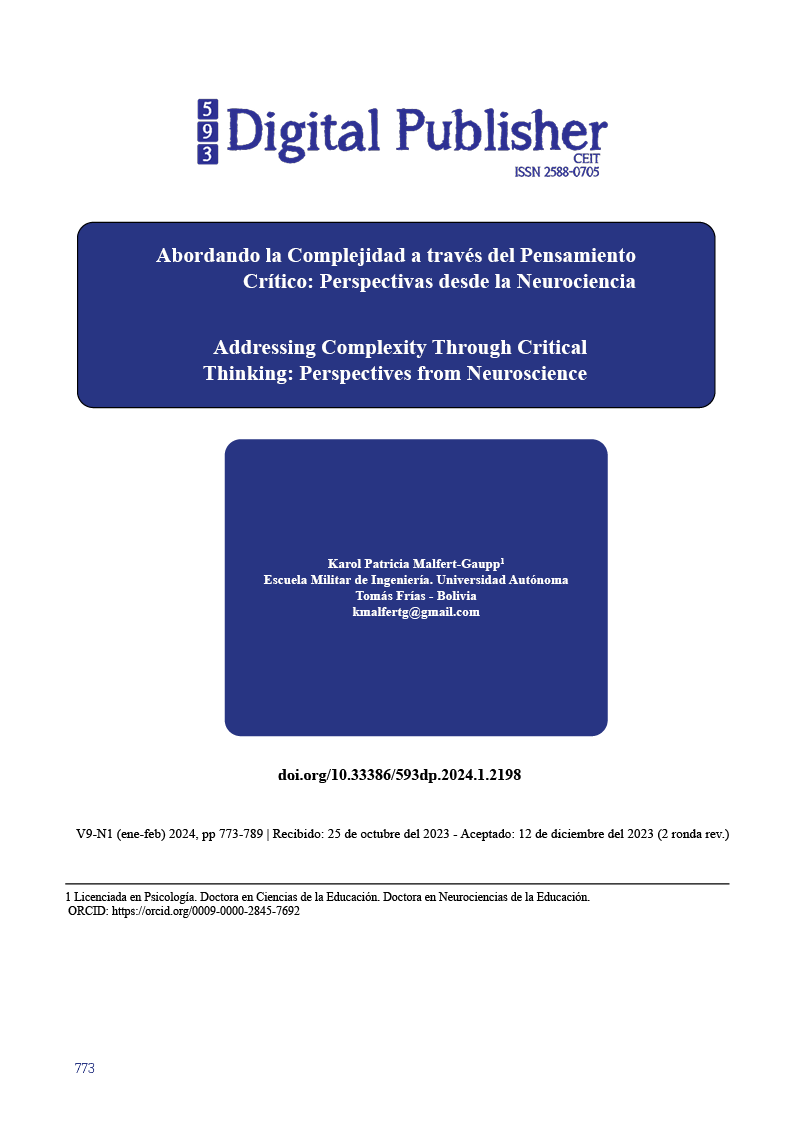Addressing complexity through critical thinking: Perspectives from neuroscience
Main Article Content
Abstract
This article explores the importance of critical thinking as a fundamental skill in modern life and examines how neuroscience sheds light on its functioning in the human brain.
The intersection between complexity, critical thinking and neuroscience is explored. In the previous studies reviewed, the connection between critical thinking and specific neural processes is highlighted, showing that this intellectual faculty is not merely abstract, but has physical bases in the brain.
The analysis focuses on brain plasticity, the synergy between brain regions and the influence of external factors on the formation of critical thinking. Additionally, complexity is examined in social and educational contexts, expanding understanding beyond the physical structure of the brain.
Looking into the future, the article suggests that the interaction between complexity, critical thinking and neuroscience will open new possibilities for interdisciplinary research. The idea of using neuroscientific discoveries to enhance the development of critical thinking and vice versa is proposed, which promises a deeper and more holistic understanding of the human mind.
The article offers a comprehensive view of how these converging areas of study contribute to our understanding of the mind and brain.
This article highlights the importance of critical thinking, explores how it relates to the human brain from a neuroscience perspective, and suggests that research and education can work together to improve these essential skills in an increasingly complex world.
Downloads
Article Details

This work is licensed under a Creative Commons Attribution-NonCommercial-ShareAlike 4.0 International License.
1. Derechos de autor
Las obras que se publican en 593 Digital Publisher CEIT están sujetas a los siguientes términos:
1.1. 593 Digital Publisher CEIT, conserva los derechos patrimoniales (copyright) de las obras publicadas, favorece y permite la reutilización de las mismas bajo la licencia Licencia Creative Commons 4.0 de Reconocimiento-NoComercial-CompartirIgual 4.0, por lo cual se pueden copiar, usar, difundir, transmitir y exponer públicamente, siempre que:
1.1.a. Se cite la autoría y fuente original de su publicación (revista, editorial, URL).
1.1.b. No se usen para fines comerciales u onerosos.
1.1.c. Se mencione la existencia y especificaciones de esta licencia de uso.
References
Bacon F. (2017) Novum organum, Edición Fondo de Cultura Económica
Bhagwati J. (2004). Indefense of Globalization. New York – Oxford University
Capra F. (2014) The Systems View of Life. Editorial Anagrama
D´angelo O. (2003) Enfoque histórico-cultural, complejidad y desarrollo humano. -En una perspectiva integradora, transdisciplinaria y emancipatoria. Editorial CIPS.
De la Herrán A. (2011). Reflexiones para una reforma profunda de la educación, desde un enfoque basado en la complejidad, la universalidad y la conciencia. Educación XX, n.1, vol. 14, pp. 245-264. Disponible en http://www.uned.es/educacionXX1/pdf
Delgado J.M. y otros. (1998) Manual de Neurociencia. Editorial Síntesis.
Ennis R. (1989), Pensamiento crítico. Editor:Prentice Hall
Ennis R. (1996), Un concepto de pensamiento crítico. Editor:Prentice Hall
Facione P. (2007). Pensamiento crítico: ¿qué es y por qué es importante? Insight Assessment. California: The California Academic Press.
Glaser E. (2007), An introduction to critical thinking. www.criticalthinking.org
Halpern D. (2014), Thought and knowledge: an introduction to critical thinking. Psychology Press Taylor & Francis
Heimer L. y ROBARDS. M.J. (1982). Neuroanatomical Tract-Tracing Methods. Plenum Press.
Kahneman D. (2012) Thinking, fast and slow. De bolsillo, Barcelona
-Kandel E. y otros. (2000). Principios de Neurociencia (Cuarta edición). McGraw-Hill Interamericana.
Marro J. (1980). ¿Qué nos hace inteligentes? Editorial: Los libros de Catarata
Maldonado C. y Gómez N. (2011). El mundo de las ciencias de la complejidad Editorial Universidad del Rosario.
Mcpeck J. (1981). Critical Thinking: The Nature of Critical and Creative Thought. Editorial: Martin Robertson
Merzenich M. (1984), "Reorganización cortical de las representaciones sensoriales en mamíferos". Universidad Católica Cardenal Raul Silva Henriquez, Chile
Merzenich M. (2013), "Soft-Wired: How the New Science of Brain Plasticity Can Change Your Life". Parnassus.
Mill J. (2017), sobre la libertad, Universitat de València
Mill J. (2019), El utilitarismo, London: Parker, Son y Bourn. Edición Digital
MORAES, M. C. (2007): “Complejidad, transdisciplinariedad y educación: algunas reflexiones”, Revista Encuentros Multidisciplinares nº 25, Vol. IX, pp. 4-13.
Morin, E. (2001). Introducción al pensamiento complejo. Barcelona: Gedisa.
Morin, E. (2011). La Vía: Para el futuro de la humanidad. Editorial Seix Barral
Paxinos G. (2004). The Rat Nervous System (Third Edition). Elsevier.
Paul R. (2003), La mini-guía para el pensamiento crítico conceptos y herramientas, Fundación para el Pensamiento Crítico (2008)
Paul R. (2005), El pensamiento crítico: ¿qué es y por qué es importante? www.criticalthinking.org
Pérez Luna, E.; Moya, N. A. y Curcu Colón, A. (2013). “Transdisciplinariedad y educación”, en Educere, vol. 17, núm. 56, enero-abril, 2013.
Puelles L. y otros. (2008). Neuroanatomía. Editorial Médica Panamericana.
Purves D. y otros. (2008). Neuroscience (Fourth Edition). Sinauer Associates.
Russell B. (1992). El conocimiento humano. Barcelona: Planeta-De Agostini (e.o.: 1948).
Richard P. (2004). La mini-guía para el Pensamiento crítico Conceptos y herramientas. Editorial Fundación para el Pensamiento Crítico
Rocha L. (2022). (Re)calientes - Por qué la crisis climática es el problema más urgente de nuestro tiempo. Siglo XXI editores
Serna E. (2016). “La transdisciplinariedad en el pensamiento de paulo Freire”, en Revista de Humanidades, núm. 33, enero-junio, 2016.
Shepherd G. (1994). Neurobiology (Third Edition). Oxford University Press.
Siegel G.J. y otros. (2006) Basic Neurochemistry (Seventh Edition). Academic Press.
Squire L. y otros. (2003) Fundamental Neuroscience (Second Edition). Academic Press.
Teilhard de Chardin P. (1984). El fenómeno humano. Barcelona: Orbis.
Taub E. (1993), "Constraint-induced movement therapy: a new approach to treatment in physical rehabilitation”. Springer Publishing Company
Zabala, A. (1999). Enfoque globalizador y pensamiento complejo. Barcelona: Graó


